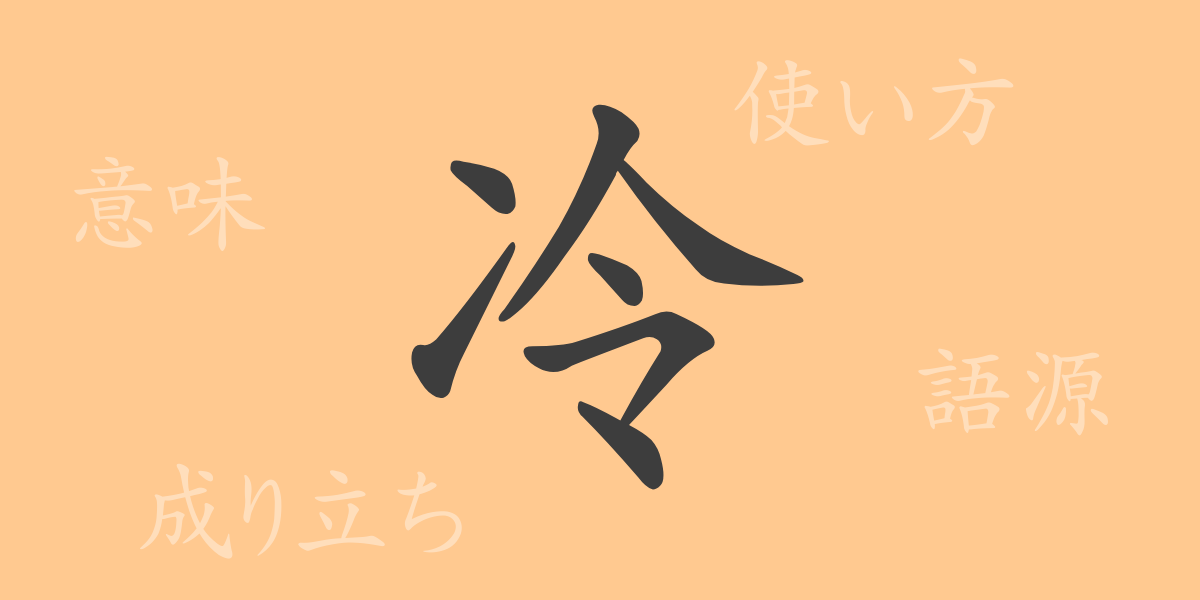In Japan, where the changing of the seasons is deeply felt, the kanji (漢字) “冷” (rei) is deeply rooted in our lives. From cold drinks that ease the summer heat to chilled hands and feet trembling in the winter cold, the meanings this single character carries are diverse. In this article, we delve into the charm of the commonly used kanji “冷” (rei), exploring its origin, readings, and the idioms in which it is used in daily life.
The Origin (語源) of 冷 (rei)
The character “冷” (rei) is formed by combining “冫” (nisui), representing ice in ancient China, and “令” (rei), which means “command.” This “令” (rei) has the meaning of “to command,” and it was said to represent the stopping of things due to cold. In other words, “冷” (rei) symbolizes a state as cold as ice or the condition where things become inactive due to cold.
Meaning and Usage of 冷 (rei)
The kanji “冷” (rei) mainly means “cold,” “to cool,” and “to chill.” These meanings not only refer to low temperatures of the weather or objects but also describe the fading of emotions. For instance, “冷たい飲み物” (tsumetai nomimono) refers to a cold beverage, and “冷たい視線” (tsumetai shisen) denotes a gaze that lacks emotion. Additionally, the expression “冷静” (reisei) is used to describe a state of being calm and not swayed by emotions.
Readings, Stroke Count, and Radical of 冷 (rei)
The readings and basic information of the kanji “冷” (rei) are as follows:
- Readings: On’yomi (音読み) is “レイ” (rei), Kun’yomi (訓読み) includes “つめ.たい” (tsume.tai), “ひ.える” (hi.eru), “ひ.や” (hi.ya), “ひ.ややか” (hi.yayaka), “ひ.やす” (hi.yasu), “ひ.やかす” (hi.yakasu), “さ.める” (sa.meru), “さ.ます” (sa.masu)
- Stroke Count: 7 strokes
- Radical: 冫 (nisui)
Idioms, Proverbs, and Expressions Using 冷 (rei)
There are several idioms, proverbs, and expressions that include “冷” (rei) as follows:
- 冷静沈着 (れいせいちんちゃく, reiseichinchaku): Refers to a state of being calm and composed without panicking.
- 冷や汗 (ひやあせ, hiyaswe): Sweat that comes from tension or fear.
- 冷める (さめる, sameru): To lose enthusiasm or emotion.
- 冷蔵庫 (れいぞうこ, reizouko): An appliance used to cool and store food.
- 冷やかし (ひやかし, hiyakashi): To browse without serious intent.
These expressions are frequently used in everyday conversations and literary works, showcasing the richness of the Japanese language.
Conclusion on 冷 (rei)
The commonly used kanji “冷” (rei) is an indispensable character for expressing coldness and calmness, as indicated by its form and meaning. This kanji, frequently used in daily life, enriches our means of expressing emotions and actions through idioms and proverbs. We hope that understanding the multifaceted nature of “冷” (rei) through this article leads to a deeper comprehension of the Japanese language.

























